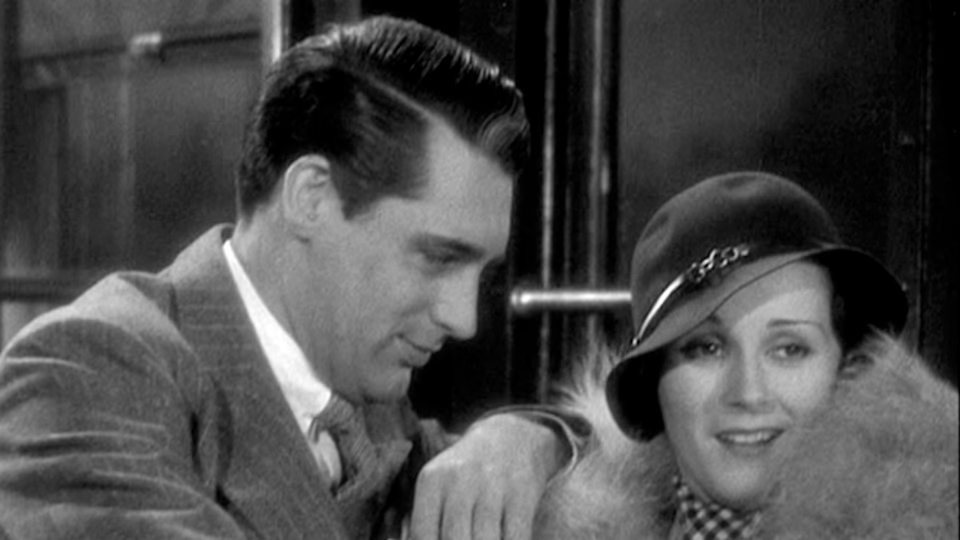Gambling Ship

Despite his miscasting as a seasoned Chicago gangster, twenty-nine-year-old Cary Grant still shines in Paramount’s Gambling Ship.
Grant plays Ace Corbin. As the film opens, he narrowly escapes a conviction that would have put him behind bars.
Shaken by the experience, he resolves to quit the business and heads west by train to California. On the train, using an assumed name, he meets a society lady named Evelyn, played by Benita Hume. Romance blooms.
We soon learn Evelyn isn’t a society lady at all, but the moll of Joe Burke, a San Francisco gambling ship operator. Like Ace, Joe’s as honest as crooks get, but he’s getting squeezed by a rival ship who steals his customers and plants cheats to take his casino for thousands. Out of money and unable to cover his debts, Joe is in trouble.
Upon arriving in San Francisco, we get the obligatory pre-Code cheesecake, with Evelyn naked in a steam-filled shower followed by shots of her dressing and putting on tights. She confesses to her roommate that she’s fallen in love and plans to leave Joe.
Evelyn reconsiders when she realizes the depth of Joe’s trouble. She hocks her jewelry to help cover some of his debt, while Joe visits Ace and pitches a partnership.
Joe reveals to Ace that the underhanded rival who’s squeezing him is the same rat who fingered Ace for the rap he narrowly beat in Chicago, a sullen thug named Pete Manning.
Despite this, Ace declines Joe’s offer, eager to resume his romance with Evelyn. But after she feigns a sick uncle to avoid seeing him, Ace is despondent.
Pete soon sends some goons around to shoo Ace out of town. When that doesn’t work, they plot an ambush, which Ace short-circuits.
Frustrated, Ace agrees to Joe’s offer. This leads to both Ace’s and Evelyn’s deceptions being revealed as their worlds collide, with Joe caught in the middle and Pete breathing down their necks.
The film plays as a mix of light-hearted crime film and romance, perhaps best illustrated when a frustrated Ace says, “Boy, I’m gonna have a vacation if I have to kill a few guys.”
The combination is reminiscent of Jewel Robbery, High Pressure, and—to a lesser degree—One Way Passage, all Warner Bros. productions starring William Powell. Indeed, in Cary Grant, the Making of a Hollywood Legend, Mark Glancy reports that when first choice George Raft wasn’t available, Paramount tried to get Powell, who also had scheduling conflicts, leaving the role to fall to Grant.
That said, Grant and the rest of the cast aren’t half-bad. Yes, Grant is miscast, with greying temples to pass for more than his twenty-nine years, but he’s still playing Cary Grant with all the charm that entails. He may lack chemistry with Hume, but I appreciated her understated performance, and her smirk reaction when she realizes Grant’s true identity charmed. Karns entertains in the sidekick role. In a running gag, when he’s not helping Ace or Joe out of a jam, he’s practicing card tricks.
The production surprises. The finale utilizes the simple but effective technique of bobbing the camera to simulate the rocking ship on stormy seas. With the actors miming being jostled about, it gives the appearance of a moving set. Though common now, with the bulky sound cameras in the early 1930s, this was novel, and the film doesn’t overdo it.
The biggest problem comes with the non-ending. In a laughably abrupt transition, Grant goes calling Hume a two-timing chiseler and declaring he’d never “double-cross a partner for a dame when there’s a thousand like her running around loose,” to cuddled up with her on a train heading out of town. Rather than resolving the triangle it’s created, the script punts with a deus ex machina moment, then, a few minutes later, the credits. It’s like the film lost a final reel.
Still, Grant fans should enjoy this early effort, as should fans of Powell’s similar light-hearted crime pictures, provided they can overlook the film’s shortcomings.